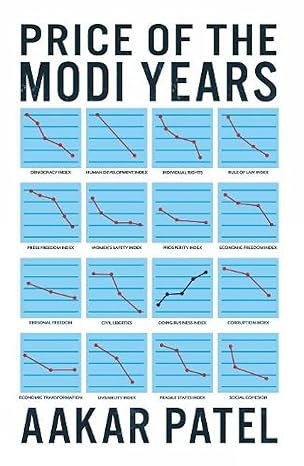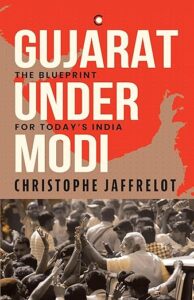Why I Picked This Book
The suppression and misuse of data by most governments worldwide is at its peak. Adding to this is the fake news industry, also at its peak, reaping moolah by manufacturing and spreading fake news and propaganda. The common citizen has limited access to reliable data about the economic and social indicators of our country. There is so much (mis)information floating around that it is hard to make sense of it. We can not access any credible, independent source of government data. Aakar Patel collates data and facts from different sources and puts it all in, “Price of The Modi Years”.
The author compares various data points and global indices and busts the development myth created by the government and media. He says the much-hyped and publicized “Gujrat Model” is nothing but hype. No significant change happened when Modi was chief minister of Gujrat. The author gives many examples in the book, that Gujrat was way behind in many socio-economic indicators.
The Author meticulously presents the comparison of data of various global indices of Modi’s years and before him. The picture that comes out is opposed to the popular narrative. In almost all the global indices India is worse in comparison to the period before Modi years. Someone rightly said, “The devil is in the details”, as you flip through the pages, you will understand it.
As I read the book, I felt a sense of frustration and helplessness at the same time. The state is cheating us brazenly and we can’t do much about it even after knowing the truth. For every data and fact, there are hundreds of fake news and fake WhatsApp posts circulating, creating confusion and chaos. The difference between fact and fiction is blurred. The author says that mainstream media has toed the government line and become its mouthpiece dishing out propaganda and PR to the ever-ready citizens.
The first government data on employment that showed things were bad came when it was reported that millions had lost their jobs because of demonetization and unemployment was at a four-year high. This report was ‘withheld’ and not revealed even to parliament. It was only released after the 2019 elections were over. A more comprehensive survey by the government’s National Sample Survey Organization (NSSO) found that from 2.2 percent unemployment in 2012, unemployment in India had shot up to 6.1 percent in 2018. This was the highest in four decades.
Data is suppressed; people are fed with wrong data and a strong image of government is portrayed. In the chapter, “A Policy of No Name” the author says that the government has no actual Pakistan policy and no real Pakistan strategy. “Magnanimity, pettiness, confusion, disinterest, passion, bipolarity. That is the sum substance of it. It is a hot mess”, says the author. Policies like, “Neighbourhood First”, are a complete failure with all our neighbours maintaining a distance from us and moving towards China.
“The Modi years will leave behind an India that is reduced in its neighbourhood, defensive in posture globally, and tattered in the image.”
There are thirteen chapters in the book covering a wide variety of subjects; each presented with data and facts. The author has put a lot of effort into researching, collating, and putting it all together in a book. This book can very well be a portal for everyone to look beyond the obvious. A book to see things clearly amidst the fog of misinformation and fake news spread by mainstream and social media. It makes it clear that things are not as rosy as claimed by the government and presented by the media.
A must-read book to understand the truth behind the lies, data fudging, and outright data suppression by the government with tacit support from the media.
About The Author
Aakar Patel is a columnist who has edited English and Gujarati newspapers. His translation of Saadat Hasan Manto’s Urdu non-fiction, Why I Write, published by Tranquebar in 2014. His study of majoritarianism in India, Our Hindu Rashtra: What It Is. “How We Got Here“, published by Westland in 2020. He is Chair of Amnesty International India.


